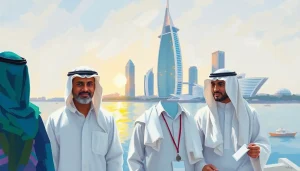From modest pearling origins to a gleaming financial powerhouse, Bahrain’s remarkable transformation into the Gulf’s premier banking hub offers a masterclass in economic reinvention that continues to draw investors and entrepreneurs from across the globe. This tiny island nation, nestled in the heart of the Persian Gulf, has defied expectations and carved out a unique niche for itself in the competitive landscape of Middle Eastern economies.
Bahrain’s journey from a sleepy pearl-diving outpost to a bustling financial center is a testament to the power of vision, adaptability, and strategic planning. As one of the smallest members of the Gulf Cooperation Council (GCC), Bahrain has punched well above its weight, leveraging its strategic location and forward-thinking policies to become a beacon of economic prosperity in the region.
A Pearl of Economic Wisdom: Bahrain’s Rise to Prominence
Bahrain’s economic story is one of constant evolution and reinvention. Long before the discovery of oil, the island’s economy revolved around its thriving pearl industry. Divers would brave the depths of the Persian Gulf, risking life and limb in search of these precious gems. This industry formed the backbone of Bahrain’s economy for centuries, shaping its culture and identity.
However, the pearl trade’s dominance was not to last. The early 20th century saw the introduction of cultured pearls from Japan, which dealt a severe blow to Bahrain’s traditional industry. But as one door closed, another opened. In 1932, Bahrain struck black gold, becoming the first Gulf state to discover oil. This momentous event would set the stage for the country’s rapid transformation.
Today, Bahrain stands as a shining example of economic diversification in the GCC. While its neighbors Saudi Arabia and Kuwait still heavily rely on oil revenues, Bahrain has successfully pivoted towards a more balanced economic model. The country’s GDP is now driven by a mix of sectors, with financial services, manufacturing, and tourism playing increasingly important roles.
Black Gold and Beyond: The Evolution of Bahrain’s Oil Sector
The discovery of oil in Bahrain was a watershed moment in the country’s history. It provided the financial impetus for modernization and development, funding infrastructure projects and social programs that laid the foundation for Bahrain’s future prosperity. For decades, oil dominated Bahrain’s economy, accounting for the lion’s share of government revenues and exports.
However, Bahrain’s oil reserves were never as vast as those of its neighbors. This limitation, which might have been seen as a disadvantage, actually spurred the country to diversify its economy earlier than many of its Gulf counterparts. Today, Bahrain’s oil production stands at around 200,000 barrels per day, a fraction of what giants like Saudi Arabia or the UAE produce.
Recognizing the finite nature of its oil reserves, Bahrain has been proactive in reducing its dependence on hydrocarbons. The country has invested heavily in developing its downstream oil and gas sectors, focusing on refining and petrochemicals. The Bahrain Petroleum Company (BAPCO) operates one of the largest oil refineries in the Middle East, processing both domestic and imported crude oil.
Moreover, Bahrain has been at the forefront of exploring alternative energy sources. The country has ambitious plans to increase its renewable energy capacity, with solar power projects leading the charge. This forward-thinking approach not only helps secure Bahrain’s energy future but also positions the country as a leader in sustainable development in the Gulf region.
Banking on Success: Bahrain’s Financial Services Sector
If oil was the engine of Bahrain’s initial economic growth, financial services have become the turbocharger propelling the country into the 21st century. Bahrain has successfully positioned itself as the financial hub of the Middle East, earning the moniker “Wall Street of the Gulf.”
The roots of Bahrain’s financial sector can be traced back to the 1970s when the country adopted a series of progressive policies to attract international banks and financial institutions. The establishment of the Bahrain Monetary Agency (now the Central Bank of Bahrain) in 1973 marked a significant milestone, providing a robust regulatory framework that instilled confidence in foreign investors.
Today, Bahrain’s financial services sector is a diverse ecosystem encompassing conventional banking, investment banking, insurance, and wealth management. The country is home to over 400 financial institutions, including both domestic and international players. This concentration of financial expertise has created a virtuous cycle, attracting more businesses and talent to the island.
One area where Bahrain has truly distinguished itself is Islamic finance. The country has emerged as a global leader in this rapidly growing sector, hosting the largest concentration of Islamic financial institutions in the Middle East. Bahrain’s Islamic banking assets have grown exponentially over the past decade, reflecting the increasing global demand for Sharia-compliant financial products.
The success of Bahrain’s financial sector owes much to the country’s regulatory environment. The Central Bank of Bahrain is widely regarded as one of the most progressive and transparent regulators in the region. Its approach balances innovation with prudent oversight, creating a fertile ground for financial institutions to thrive while maintaining the integrity of the system.
Open for Business: Foreign Investment and Economic Zones
Bahrain’s economic success story is inextricably linked to its ability to attract foreign investment. The country has long recognized the importance of creating a business-friendly environment to lure international capital and expertise. This commitment is reflected in Bahrain’s consistently high rankings in global ease of doing business indices.
One of the cornerstones of Bahrain’s foreign investment strategy has been the establishment of specialized economic zones. These zones offer a range of incentives to foreign companies, including 100% foreign ownership, tax exemptions, and streamlined bureaucratic procedures. The Bahrain Logistics Zone, for instance, has become a major hub for regional distribution and logistics operations, leveraging the country’s strategic location at the heart of the Gulf.
The Bahrain International Investment Park is another success story, attracting manufacturing and services companies from around the world. Companies operating in these zones benefit from Bahrain’s excellent infrastructure, skilled workforce, and access to regional markets.
Major multinational corporations have taken notice of Bahrain’s attractive business environment. Companies like Amazon Web Services, Huawei, and Mondelez International have established significant operations in the country, further cementing its reputation as a business-friendly destination.
Sun, Sand, and Skyscrapers: Tourism and Real Estate in Bahrain
While financial services and foreign investment have been the main drivers of Bahrain’s economic growth, the country has not neglected other potential sources of wealth. Tourism and real estate have emerged as increasingly important sectors, contributing significantly to Bahrain’s economic diversification efforts.
Bahrain’s tourism industry has experienced remarkable growth over the past two decades. The country has successfully leveraged its rich history, modern infrastructure, and strategic location to attract visitors from around the world. The annual Bahrain Grand Prix, part of the Formula One World Championship, has put the country on the global sporting map and attracts thousands of high-spending visitors each year.
Cultural tourism is another area where Bahrain has made significant strides. The country’s efforts to preserve and promote its heritage have paid off, with sites like the Qal’at al-Bahrain (Bahrain Fort) and the Pearling Path in Muharraq being recognized as UNESCO World Heritage Sites. These attractions, combined with Bahrain’s modern shopping malls, luxury hotels, and vibrant dining scene, offer visitors a unique blend of tradition and modernity.
The real estate sector in Bahrain has also seen substantial growth, driven by both local and foreign investment. The country’s liberal property ownership laws, which allow foreigners to own freehold property in designated areas, have been a major draw for international investors. High-profile developments like the Bahrain Bay and Diyar Al Muharraq have transformed the country’s skyline and created new opportunities in the residential, commercial, and retail sectors.
The synergy between tourism and real estate has been particularly beneficial for Bahrain’s economy. The growth in tourism has fueled demand for hotels and holiday homes, while the development of new real estate projects has, in turn, enhanced Bahrain’s appeal as a tourist destination. This virtuous cycle has contributed significantly to the country’s wealth generation and economic diversification.
Navigating Choppy Waters: Challenges and Future Outlook
Despite its impressive economic achievements, Bahrain faces several challenges as it looks to the future. The ongoing need for economic diversification remains paramount. While the country has made significant strides in reducing its reliance on oil, hydrocarbons still account for a substantial portion of government revenues. Continuing to develop non-oil sectors will be crucial for Bahrain’s long-term economic sustainability.
Regional competition presents another challenge. Neighboring countries like the UAE and Qatar have also been aggressively pursuing economic diversification and positioning themselves as business and tourism hubs. Bahrain will need to continue innovating and leveraging its unique strengths to maintain its competitive edge in the region.
The global shift towards renewable energy and the long-term decline in oil demand pose both challenges and opportunities for Bahrain. While this trend threatens traditional revenue streams, it also opens up new possibilities in sectors like green technology and sustainable finance. Bahrain’s early moves into renewable energy and its strong financial sector position it well to capitalize on these emerging trends.
Looking ahead, several sectors show promise for driving Bahrain’s future economic growth. The country’s burgeoning tech startup ecosystem, supported by initiatives like the Bahrain FinTech Bay, could become a major source of innovation and job creation. The manufacturing sector, particularly in high-value industries like aerospace and pharmaceuticals, also has significant growth potential.
Bahrain’s commitment to developing its human capital through education and training programs bodes well for its future economic prospects. The country’s young, well-educated workforce is increasingly seen as one of its most valuable assets, capable of driving innovation and productivity across various sectors.
Pearls of Wisdom: Lessons from Bahrain’s Economic Journey
Bahrain’s transformation from a pearl-diving economy to a modern financial powerhouse offers valuable lessons for nations seeking to reinvent their economies. The country’s success can be attributed to several key factors: a willingness to embrace change, a commitment to creating a business-friendly environment, strategic investments in infrastructure and human capital, and a forward-thinking approach to economic diversification.
The resilience and adaptability that Bahrain has demonstrated throughout its economic journey are perhaps its most valuable assets. From the decline of the pearl industry to the challenges posed by fluctuating oil prices, Bahrain has consistently shown an ability to pivot and find new sources of economic growth.
As Bahrain looks to the future, it does so from a position of strength. The country’s well-developed financial sector, strategic location, modern infrastructure, and progressive policies provide a solid foundation for continued economic growth and wealth generation. While challenges remain, Bahrain’s track record of economic reinvention suggests that it is well-equipped to navigate the complexities of the global economy and emerge even stronger.
In the grand tapestry of Middle Eastern economies, Bahrain may not be the largest or the wealthiest thread. But its vibrant colors, intricate patterns, and resilient fibers make it an indispensable part of the region’s economic fabric. As the pearl divers of old knew, sometimes the most precious treasures come in small packages. Bahrain’s economic success story proves that with vision, adaptability, and strategic planning, even a small island nation can make a big splash on the global economic stage.
References:
1. Central Bank of Bahrain. (2021). Financial Stability Report. Available at: https://www.cbb.gov.bh/publications/
2. Economic Development Board Bahrain. (2022). Bahrain Economic Quarterly Report.
3. International Monetary Fund. (2021). Bahrain: 2021 Article IV Consultation. IMF Country Report No. 21/146.
4. Oxford Business Group. (2021). The Report: Bahrain 2021.
5. World Bank. (2022). Doing Business 2022: Bahrain. Available at: https://www.doingbusiness.org/en/data/exploreeconomies/bahrain
6. Bahrain Economic Development Board. (2022). Bahrain Economic Vision 2030.
7. KPMG. (2021). Bahrain Banking Perspectives 2021.
8. PwC. (2022). Doing Business in Bahrain: A Tax and Legal Guide.
9. Bahrain Tourism and Exhibitions Authority. (2022). Annual Tourism Statistics Report.
10. Bahrain Ministry of Oil and Gas. (2021). Oil and Gas Sector Overview.












Would you like to add any comments? (optional)